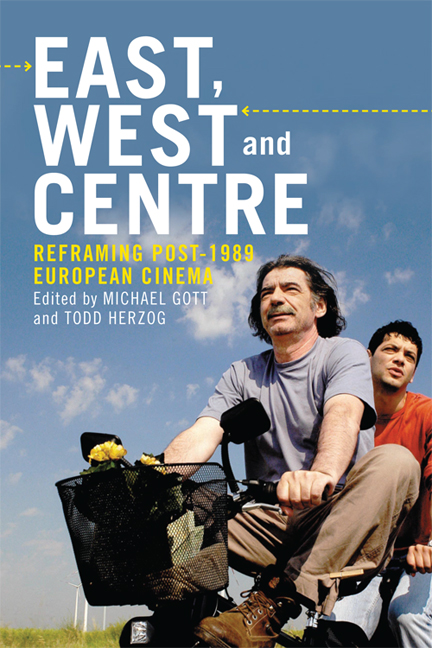Book contents
- Frontmatter
- Contents
- List of Figures
- Notes on Contributors
- Acknowledgements
- Introduction: East, West and Centre: ‘Mapping Post-1989 European Cinema’
- Part I Redrawing the Lines: De/Recentring Europe
- Part II Border Spaces, Eastern Margins and Eastern Markets: Belonging and the Road to/from Europe
- Part III Spectres of the East
- 14 Through the Lens of Black Humour: A Polish Adam in the Post-Wall World
- 15 East Germany Revisited, Reimagined, Repositioned: Representing the GDR in Dominik Graf's Der rote Kakadu (2005) and Christian Petzold's Barbara (2012)
- 16 Barluschke: Towards an East–West Schizo-history
- 17 The Limits of Nostalgia and (Trans)National Cinema in Cum mi-am petrecut sfârşitul lumii (2006)
- 18 The Ideal of Ararat: Friendship, Politics and National Origins in Robert Guédiguian's Le Voyage en Arménie
- Notes
- Bibliography
- Index
18 - The Ideal of Ararat: Friendship, Politics and National Origins in Robert Guédiguian's Le Voyage en Arménie
from Part III - Spectres of the East
Published online by Cambridge University Press: 05 September 2016
- Frontmatter
- Contents
- List of Figures
- Notes on Contributors
- Acknowledgements
- Introduction: East, West and Centre: ‘Mapping Post-1989 European Cinema’
- Part I Redrawing the Lines: De/Recentring Europe
- Part II Border Spaces, Eastern Margins and Eastern Markets: Belonging and the Road to/from Europe
- Part III Spectres of the East
- 14 Through the Lens of Black Humour: A Polish Adam in the Post-Wall World
- 15 East Germany Revisited, Reimagined, Repositioned: Representing the GDR in Dominik Graf's Der rote Kakadu (2005) and Christian Petzold's Barbara (2012)
- 16 Barluschke: Towards an East–West Schizo-history
- 17 The Limits of Nostalgia and (Trans)National Cinema in Cum mi-am petrecut sfârşitul lumii (2006)
- 18 The Ideal of Ararat: Friendship, Politics and National Origins in Robert Guédiguian's Le Voyage en Arménie
- Notes
- Bibliography
- Index
Summary
How did the opening up of a binary Yalta Europe to a more diverse continent, with new possibilities of movement across borders, change the way French directors depicted national identity? Asking this question of Robert Guediguian is revealing because it forces us to consider two distinct themes of personal identity in his work and a possible tension between them: class solidarity and national origins.
Guediguian, who was raised in a working-class, communist family, has built a well-earned reputation for his hard-line, leftist political ideology, expressed, at times, through an acerbic but humanistic comedy, at other times through anger and tragedy. He is also known for having focused his camera on the history and socio-economic struggles of the inhabitants of Estaque, the working-class neighbourhood of Marseilles where he grew up. While Guediguian remains close to the Communist Party today, he does not give the impression that the fall of the Berlin Wall was a tragedy. In fact, his dissatisfaction and dissociation from the party predates 1989 by a decade. As Martin O'Shaughnessy has written, Guediguian ‘chose deliberately to work in what [one] might call the ruins where the working class used to be, examining consequences of defeat, scouting around to see what, if anything, can be salvaged from the wreckage’ (2007: 59). By moving from party politics to the cinema, Guediguian sought to define his professional life through a communal practice that was not possible in an age of partisan grandstanding and failed collaboration between communists and socialists. Surprisingly often, Guediguian names that activity friendship, and a friendship associated with resistance: the cinema was a ‘communal practice allowing us to remain friends for a long time’ (Guediguian and Danel 2008: 47). Since 1980, Guediguian has steered a straight course, self-producing his own films and working with a small group, including his spouse Ariane Ascaride, childhood friend Gerard Meylan, and Jean-Pierre Darroussin, all of whom are cast in Guediguian's film of personal origins, Le voyage en Armenie/Armenia (2006, France). With, and related to, ideology, identity for Guediguian is wrapped up in the interactions of friends.
The question of national identity after the fall of the Wall resounds more closely with Guediguian's immigrant roots. As his name indicates, Guediguian is of Armenian descent (as well as German origins on his mother's side).
- Type
- Chapter
- Information
- East, West and CentreReframing post-1989 European Cinema, pp. 279 - 292Publisher: Edinburgh University PressPrint publication year: 2014



